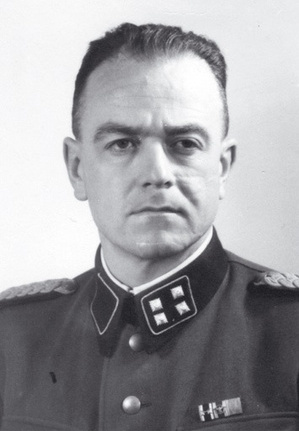Gerhard Bast
Gerhard Bast (born January 12, 1911 in Gottschee , Austria-Hungary ; † March 9, 1947 at the Brenner Pass ) was an Austrian lawyer, SS-Sturmbannführer , Gestapo employee and leader of the special commandos of the security police and SD .
Life
Gerhard Bast, son of the lawyer Rudolf Bast, grew up in a German national family. The family moved to Amstetten in 1912 . Bast attended the humanistic grammar school in Wels. After graduating from high school, he studied law at the University of Graz from 1929 , where he became a member of the Germania Graz fraternity in 1929 . Bast graduated from law school at the end of 1935 with a doctorate . In October 1931 he joined the NSDAP ( membership number 612.972) and shortly afterwards the SS (SS number 23.064). After graduating, Bast was at the St. Pölten District Courtactive, but lost this job shortly afterwards due to National Socialist activities. Bast then worked in his father's office, who was also a staunch National Socialist.
After Austria was annexed to the German Reich , Bast became a member of the SD and the Gestapo on March 20, 1938 . Bast was first assigned to the Gestapo in Graz , where he became head of the department for research and combat against opponents in the spring of 1940 . In August 1940, Bast switched to the Koblenz Gestapo and from January 1941 headed the state police control center in Linz on behalf of the absent Humbert Achamer-Pifrader . In the SS he reached the rank of Sturmbannführer in 1941 and was also promoted to government councilor. From July 1941 he was deputy head of the Gestapo in Münster . In this role, Bast was significantly involved in the deportation of Jews from Germany and participated in the executions of Polish slave laborers .
From November 1942 to December 1942 he was the leader of Sonderkommando 11a in Einsatzgruppe D , where he was in charge of the murder of Jews. In January 1943 Bast was transferred to Linz and headed the Gestapo there. In November 1943, Bast accidentally killed a driver boy while hunting. Since he was able to “prove himself” in the eastern deployment, Bast did not have to serve a four-month prison sentence.
From June 1944 to October / November 1944 Bast was the leader of Sonderkommando 7a in Einsatzgruppe B. Afterwards he was deployed with his Sonderkommando in Einsatzgruppe H under the BdS Pressburg to fight partisans.
Bast received the following awards: War Merit Cross I and II Class with Swords, Merit Award for members of the Eastern Nations II Class in silver and the Army Victory Cross III. Class with swords. He was considered an old fighter .
At the end of the Second World War he went underground under a false name. As an alleged farmhand and woodcutter, he finally found accommodation and employment with a farmer in the South Tyrolean region. In March 1947 he wanted to return to his family in Innsbruck and have a smuggler take him over the guarded Brenner Pass. Before he even reached the Brenner Pass, the smuggler killed Bast with three shots, robbed him and was sentenced to 30 years imprisonment for robbery and murder in 1949.
The Austrian writer Martin Pollack is the illegitimate son of Gerhard Bast. Pollack wrote the book: The Dead in the Bunker . Report about my father , published in Vienna in 2004.
literature
- Helge Dvorak: Biographical Lexicon of the German Burschenschaft. Volume I: Politicians. Volume 7: Supplement A – K. Winter, Heidelberg 2013, ISBN 978-3-8253-6050-4 , pp. 45-46.
- Ernst Klee : The dictionary of persons on the Third Reich . Fischer, Frankfurt am Main 2007. ISBN 978-3-596-16048-8 . (Updated 2nd edition)
- Martin Pollack: The dead man in the bunker. Report on my father . Zsolnay, Vienna 2004, ISBN 3-552-05318-2 .
- Gerald Steinacher : Nazis on the run. How war criminals escaped overseas via Italy , Frankfurt a. M. 2010, ISBN 978-3-596-18497-2 . (Paperback edition)
Web links
- Minutes of an interrogation of Bast's father in 1947 in the IFZ archive (PDF; 2.6 MB)
- Biography Dr. Gerhard Bast at Landesgeschichte OÖ
Individual evidence
- ↑ a b Ulrich Weinzierl: The murderer in my genes - How to remain "honorable and decent" in the Third Reich. Martin Pollack searches for his father , Die Welt, September 11, 2004
- ↑ a b c d e Henryk M. Broder : The dashing Gerd . In: Der Spiegel . No. 39 , 2004, p. 174 f . ( online ).
- ↑ The guilt of the father - The writer Martin Pollack on the SS past of his father on www.3sat.de
- ↑ a b biography Gerhard Bast, Dr. at Landesgeschichte OÖ
- ↑ a b Ernst Klee: Das Personenlexikon zum Third Reich , Frankfurt am Main 2007, p. 30.
- ↑ Christian Pichler: The father, a war criminal - Martin Pollack: The dead in the bunker. Report about my father on www.stifter-haus.at
| personal data | |
|---|---|
| SURNAME | Bast, Gerhard |
| BRIEF DESCRIPTION | Austrian lawyer, SS-Sturmbannführer and Gestapo employee |
| DATE OF BIRTH | January 12, 1911 |
| PLACE OF BIRTH | Gottschee |
| DATE OF DEATH | March 9, 1947 |
| Place of death | Brenner Pass |
